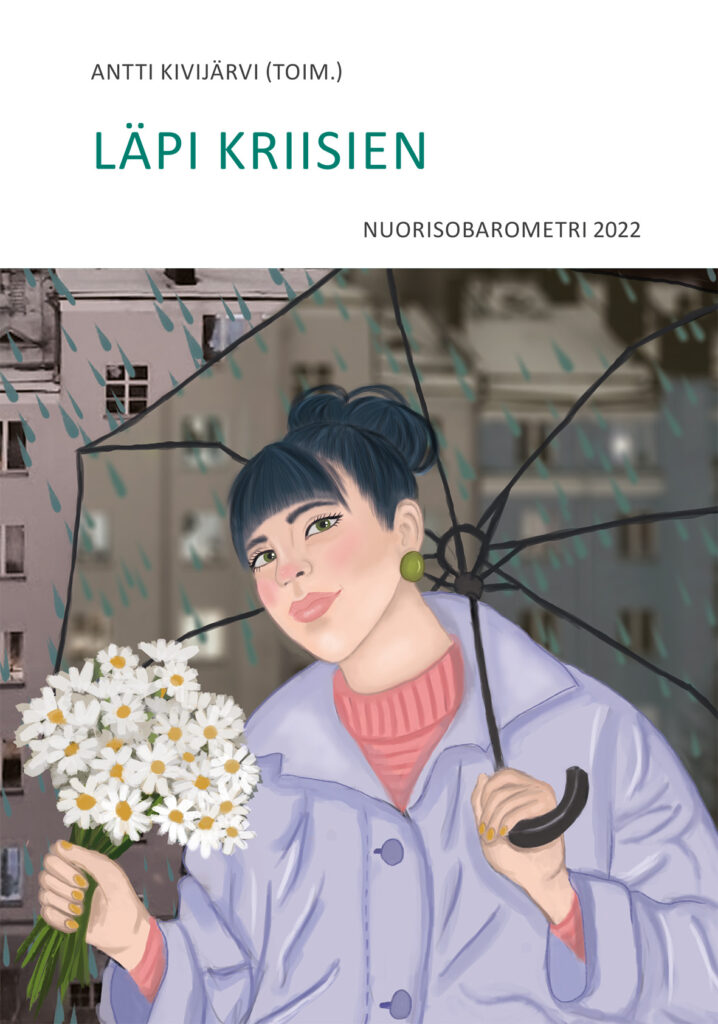Despite the crises in recent years, the majority of young people report less uncertainties and insecurities in their daily lives. Among other issues, young people are less concerned about their livelihood, employment, health and living environment than in previous years.
The results come from the Youth Barometer 2022, which focuses on resilience – the ability of young people to recover after facing adversities. The Youth Barometer is published by the State Youth Council (Visit an external site. The link opens in a new tab.) and the Finnish Youth Research Network. The interviews for the Youth Barometer were conducted in January and February 2022, when some of the Corona restrictions were still in force. However, almost all interviews were conducted before the start of Russia’s invasion in Ukraine.
The majority of young people are recovering from the stresses caused by Corona restrictions
In addition to reduced experiences of uncertainty, other positive developments can be observed in the results of the Youth Barometer 2022. Young people’s life satisfaction has increased after a notch at the beginning of the pandemic. Young people’s overall life satisfaction, and satisfaction to social relationships, leisure time, health and financial situation were largely at pre-pandemic levels in spring 2022.
– From the perspective of life satisfaction, it seems that the majority of young people have started to recover from the blows caused by the pandemic and various restrictions which burdened the daily lives of particularly young people. However, the situation needs to be monitored closely in the coming years, and with different indicators and from the perspective of inequalities, says Antti Kivijärvi, a Senior Researcher at the Finnish Youth Research Network.
Many young people are able to withstand and recover from adversities
Young people were asked to assess their own resilience using an internationally used set of questions. In an international comparison, young people living in Finland rated their resilience as relatively strong. This was particularly the case for young people who reported good relationships with friends and family.
– The importance of peer relationships during adolescence is highlighted in the case of resilience as well. Supporting peer relations of young people should be addressed in all youth services and in the education system, says Kivijärvi.
Young people’s assessments of their resilience varied between groups. Particularly those who identified themselves as minorities, those who were excluded from the labour market, those from immigrant backgrounds and women rated their resilience as relatively low. Recurrent adversities were also associated with assessments of relatively low resilience. In other words, societal statuses and previous experiences strongly determine young people’s assessments of their resilience.
– In addition to close friends, services were perceived as an important support factor. Services were particularly important for those young people who may not have access to supportive relationships. The next government should take steps both to increase community involvement and to safeguard and improve public services. For example, funding for school-based youth work should be made permanent, says Elisa Gebhard, Chair of the State Youth Council.
Young people’s contacts with friends are in a state of flux
Young people’s face-to-face contacts with friends had decreased significantly compared to 2015. It is likely that the restrictions during the pandemic era have very likely contributed to the change. There were no significant changes in the intensity of online contacts with friends while speaking in phone with friends had decreased further. In other words, the decrease in face-to-face contact had not been compensated with technology-mediated communication.
– Restrictive measures during the pandemic have had a negative impact on young people’s peer sociability. Changes in contacts with friends need to be monitored closely. Particularly face-to-face contacts with friends are strongly associated with loneliness and subjective well-being of young people. The more people meet, the better they perceive their well-being, concludes Kivijärvi.
More information
Antti Kivijärvi
Senior Researcher, Finnish Youth Research Network
antti.kivijarvi@youthresearch.fi
Elisa Gebhard
Chair, State Youth Council
elisa.gebhard@gmail.com
Anna-Maria Tenojoki
Secretary General, State Youth Council
anna-maria.tenojoki@gov.fi
Publication details

Antti Kivijärvi (ed.) Through Crises. Youth Barometer 2022. State Youth Council & Finnish Youth Research Association/Finnish Youth Research Network & Ministry of Education and Culture, ISBN 978-952-372-045-9, Publications (Finnish Youth Research Association) ISSN 1799-9219, number 243, series: Field, State Youth Council Publications 71, language: Finnish, print, 212 pages, 30 euros.
The publication is only available in Finnish.
The online version of the Youth Barometer (Visit an external site. The link opens in a new tab.) (in Finnish) is available free of charge on the website of State Youth Council.
The Youth Barometer
The Youth Barometer is an annual survey conducted since 1994, targeting 15–29-year-olds living in Finland. Consequently, there is almost 30 years of data on young people’s values, attitudes and experiences. Since 2004, the Youth Barometer has been published in cooperation between the State Youth Council and the Finnish Youth Research Network.
Some of the questions in the Youth Barometer are repeated in different years, which allows to monitor trends over time. In addition to the core themes of work and education, the topics that have been monitored for a long time include trust, housing, future, social life, and life satisfaction. In addition to observing trends, an annually changing theme addresses current and relevant issues for youth policy.
The 2022 Youth Barometer is based on 1,864 telephone interviews conducted between 19 January 2022 and 27 February 2022.

